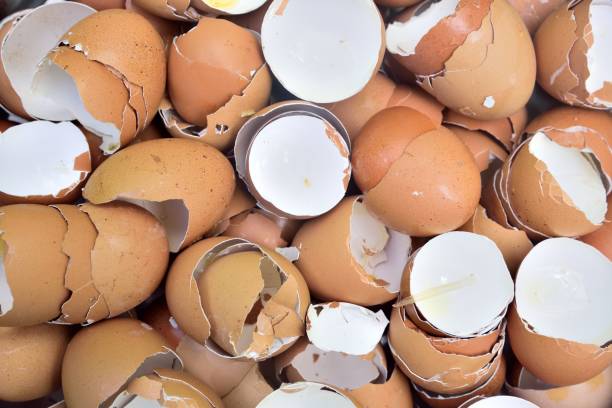By Malaika
Eggshells, often thought of as waste, actually have numerous surprising and practical uses that extend far beyond the kitchen due to their calcium carbonate (CaCO3) content, which comprises approximately 87-90% of their composition. One of the most important uses is as a natural fertilizer.
By crushing eggshells and incorporating them into garden soil, gardeners can help strengthen plant cell walls, improve soil structure, and promote healthy plant growth.
The gradual breakdown of the shells in the soil releases calcium slowly, offering long-term benefits to plants. In addition to enhancing garden soil, eggshells act as a barrier against pests. Crushed eggshells, when spread around plants, act as a barrier that slugs, snails, and some insects avoid due to the sharp edges. This creates a natural and eco-friendly alternative to chemical pesticides, protecting plants from damage without harming the environment.
Furthermore, when eggshells are ground into a fine powder, they can be added to animal feed. This is particularly beneficial for chickens, as the calcium helps in the production of stronger eggshells for future laying cycles.
Eggshells can also help remove stains from thermoses and coffee mugs; placing some crushed shells inside the container with water and shaking can scrub away built-up residue.
This natural source of calcium may also benefit individuals suffering from osteoporosis by helping to improve bone density over time. Artists and crafters also find unique uses for eggshells. In piecework art, small pieces of eggshells can be painted and arranged into complex designs.
Moreover, eggshells have an unexpected role in water purification. The calcium carbonate in eggshells can help remove impurities such as heavy metals and dyes from water.
Eggshells gain popularity as a key ingredient in DIY skincare within the beauty industry. Ground eggshell powder can be mixed with egg whites or honey to create a natural scrub, removing dead skin cells and promoting smoother, healthier skin.
Eggshells are utilized in various cosmetic applications due to their beneficial properties. In skincare, they provide anti-aging and anti-inflammatory benefits. In hair care, eggshells strengthen hair follicles and improve scalp health. Additionally, they are used in nail polish as a natural, calcium-rich base coat.
Surprisingly, eggshells can even improve the taste of coffee. In some cultures, adding crushed eggshells to coffee grounds helps reduce bitterness by neutralizing the acidity. The alkaline nature of the eggshells balances the pH of the coffee, resulting in a smoother and less acidic flavor. This simple technique has been passed down through generations and remains a favorite among those who prefer a milder cup of coffee.
To ensure safety, eggshells should be thoroughly sterilized before using them in food applications. In cooking, these can be used to clarify soups and stocks. Eggshell powder can also serve as a calcium supplement by adding it to juices, smoothies, and other recipes. When using eggshell powder, ensure clean and dry eggshells thoroughly, grind into a fine powder, store in an airtight container.
Eggshells are being used in 3D printing as a sustainable material, creating eco-friendly prints when mixed with bioplastics. These are utilized as various applications in food industry. They are also used to create bioplastics for food packaging, replacing traditional plastics.
In energy applications, eggshells improve biofuel production efficiency, enhance battery performance with eggshell-based materials, and support chemical reactions as catalysts.
Additionally, eggshells serve as an effective insulation material due to their lightweight and thermal properties. Furthermore, they are utilized in plastering to create a smooth, calcium-rich finish. These can be used to polish metal, offering an environmentally friendly and cost-effective alternative.
Eggshells offer a versatile platform for engaging science experiments across various disciplines. Physics and chemistry experiments involve testing their strength, demonstrating calcium carbonate reactions with vinegar, investigating thermal insulation properties, and exploring soundproofing capabilities.
A range of fun and easy experiments suitable for various age groups include dropping eggshells from different heights, creating marble runs, making homemade limestone, and crafting eggshell art. Specifically, elementary students can explore seed germination, bouncing eggshells, and marble runs, while middle school students delve into calcium carbonate reactions, soundproofing, and water filtration..
In conclusion, eggshells, often overlooked as waste, have numerous surprising and practical applications that extend beyond their traditional uses.




